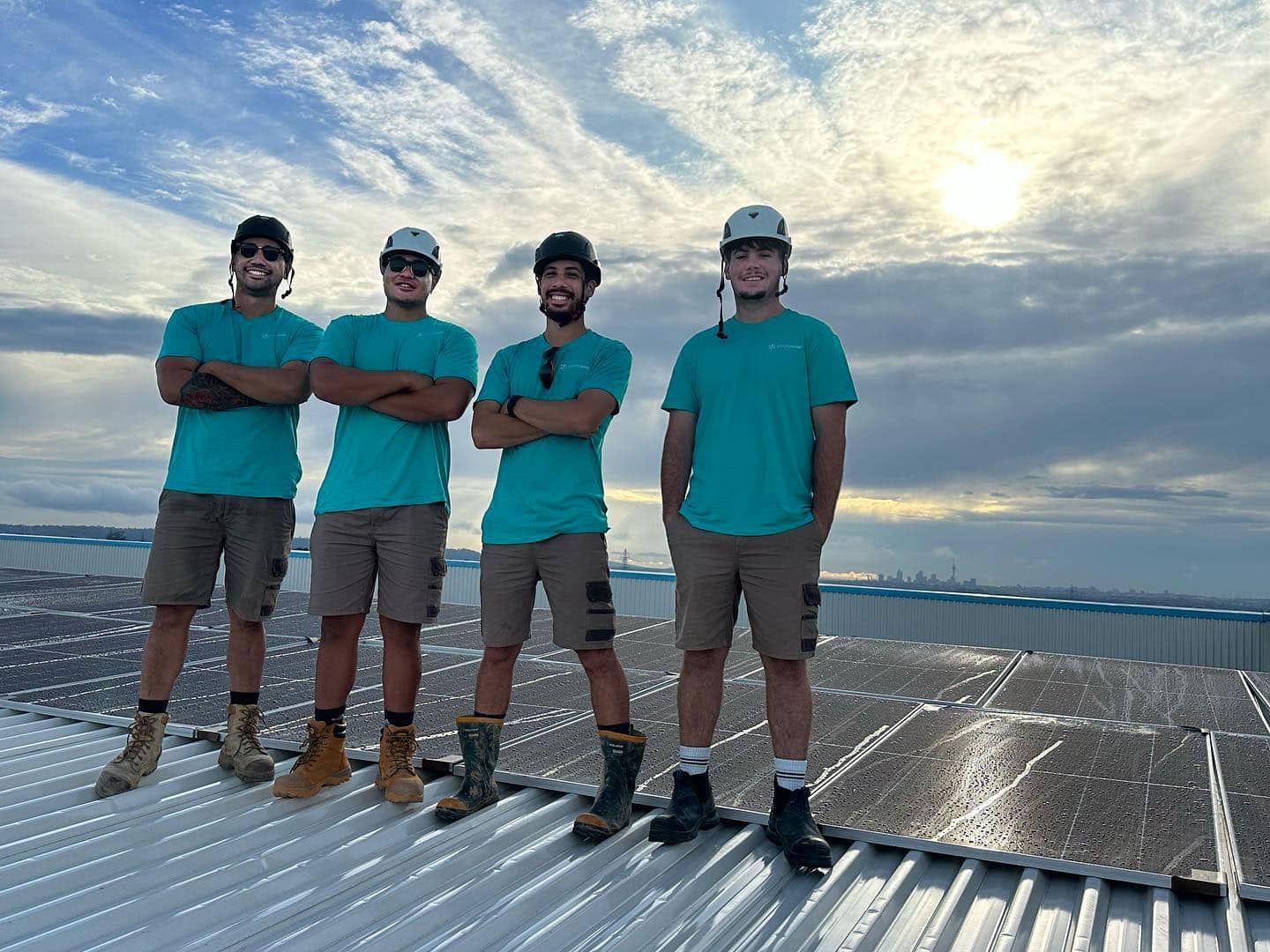

Sustainable Living is Simply Solar
At Simply Solar, our mission is to encourage sustainable living among Kiwis by supporting the switch to solar energy. We believe that it is our shared responsibility to protect our planet and create a better future for all. Empowering families in the greater Auckland region to make a positive impact on the environment starts right here in our own back yard.
3 Brothers leading the way in green living
Our goal is to help transform New Zealand’s energy landscape by providing access to clean and affordable solar power. We are working hard to inspire a culture of green living, starting with Auckland households. Join our movement of committed Kiwis dedicated to creating a cleaner, greener future for our world.

A vision for self-sufficient living in New Zealand
As qualified electricians working in the field, we recognized the immense potential of solar energy to bring about positive change in New Zealand. Our vision is to help preserve the country’s natural beauty by harnessing abundant, renewable power from the sun.
Raising the bar on solar installation
With our extensive field experience, we noticed a gap in the market for high-quality solar installations. Some home-owners are being provided subpar, inadequate, and even hazardous systems. Determined to raise the bar, we set out to demonstrate that solar power can be installed with precision, safety, and excellence.

Advancing green living
We’re committed to providing top-notch service so families across Auckland can experience the many benefits of green living. With our wealth of experience and expertise, you can be sure that your solar panel system will provide reliable power for years to come with little to no maintenance!
“Working together for a greener future”
We believe in putting ourselves in the customer’s shoes when it comes to the quality of our service – that’s why we aim to provide not just top-notch solar installations but also a seamless and educational experience that empowers Kiwis to live a sustainable lifestyle.
Our objective is not just to install solar equipment but also to enlighten Kiwis on how to harness the sun’s power and live a more self-sufficient and eco-friendly life. By reducing our reliance on traditional energy sources, we don’t only help our environment, but also reduce our monthly expenses.
We are determined to provide an alternative solution to rising electricity costs and reduce the cost of living. With Simply Solar, you can enjoy the benefits of clean and renewable energy, lower your monthly bills, and make a positive impact on the environment.
Join us in our mission to promote sustainable living.
Paora, Tai and Curtis
Sustainable Living with Solar FAQs
Sustainable living refers to a lifestyle that seeks to minimize the negative impact on the environment and natural resources while maximizing the well-being of individuals and communities. It is important because it helps to conserve resources, reduce waste, and mitigate the effects of climate change.
Having a solar power system installed in your home is one aspect of sustainable living. By generating electricity from the sun, you can reduce your reliance on non-renewable energy sources and minimize your carbon footprint. Additionally, solar power systems are cost-effective and can help you save money on your monthly energy bills. Overall, adopting self-sufficient living practices and utilizing renewable energy sources like solar power are essential for building a better and more sustainable future for all.
Solar energy is a key contributor to sustainable living in several ways:
Renewable energy source: Solar energy is renewable, meaning it will never run out and will always be available to us as long as the sun continues to shine. This makes it a sustainable energy source compared to non-renewable sources such as coal, oil, and gas.
Reduces greenhouse gas emissions: Solar energy systems do not produce any emissions during operation, unlike traditional energy sources that emit harmful greenhouse gases into the atmosphere. By using solar energy, individuals and communities can reduce their carbon footprint and help mitigate the effects of climate change.
Energy independence: With a solar power system, you can generate your own electricity and reduce your dependence on the traditional energy grid. This can help increase energy security and resilience, especially in regions with unreliable grid systems.
Cost-effective: Solar energy systems can save you money on your monthly energy bills, making it a cost-effective way to power your home and contribute to a sustainable lifestyle.
In conclusion, by adopting solar energy, individuals and communities can significantly create a more sustainable future by reducing their environmental impact.
Adopting a sustainable lifestyle has many benefits, including:
Environmental protection: A sustainable lifestyle helps reduce ecological degradation by minimizing waste, conserving resources, and reducing the use of harmful chemicals and pollutants.
Cost savings: By using energy-efficient appliances, reducing water usage, and choosing sustainable transportation options, individuals can save money on utility bills, fuel costs, and other expenses.
Improved health: sustainable living often involves eating healthier, locally-sourced foods, reducing exposure to toxic chemicals, and increasing physical activity, leading to improved physical and mental health.
Stronger communities: sustainable living often involves community engagement and collaboration, fostering a sense of community, social connectedness, and shared responsibility for the environment.
Increased self-sufficiency: By growing your own food, reducing waste, and conserving resources, you can become more self-sufficient and reduce your dependence on unsustainable systems.
Long-term sustainability: green living helps ensure the availability of resources for future generations, preserving the planet and its natural systems for years to come.
In conclusion, adopting a sustainable lifestyle has numerous benefits, including improved health, cost savings, stronger communities, and long-term sustainability.
To make your home more sustainable and eco-friendly, you can consider the following 6 steps:
- Switch to renewable energy sources such as solar energy
- Reduce energy consumption through energy-efficient appliances and lighting
- Minimize water usage through efficient fixtures and drought-tolerant landscaping
- Use environmentally-friendly products for cleaning and household tasks
- Reduce waste through composting, recycling, and reusing materials
- Support sustainable transportation options such as public transportation, biking, or electric vehicles.
Sustainable living has numerous long-term impacts on the environment:
- Reduces greenhouse gas emissions, helping to mitigate climate change
- Conserves natural resources such as water, minerals, and forests
- Protects wildlife habitats and biodiversity
- Reduces dependence on non-renewable energy sources, reducing the risk of oil spills and other environmental disasters
- Improves air and water quality, reducing the risk of environmental pollution
- Supports local economies and reduces the carbon footprint of transportation.
- By adopting sustainable living practices, individuals and communities can play a significant role in preserving the environment for future generations.
Reducing your carbon footprint can be done by implementing any of the following 6 steps to sustainable living:
- Switch to renewable energy sources, such as solar energy, which reduces your reliance on fossil fuels and reduces your carbon footprint.
- Reduce energy consumption by implementing energy-efficient practices in your home, such as using energy-saving light bulbs and appliances.
- Use public transportation, carpool, or bike instead of driving alone to reduce transportation emissions.
- Reduce waste by recycling and composting, and reduce your consumption of single-use products.
- Support sustainable agriculture by eating locally-grown and organic foods, reducing the carbon emissions associated with transportation and fertilizers.
- Choose eco-friendly products and support companies that prioritize sustainability and reduce their own carbon footprint.
By taking these steps and incorporating sustainable practices into your daily life, you can significantly reduce your carbon footprint and make a positive impact on the environment.
Transitioning to a sustainable lifestyle can be a challenging process, but there are several common barriers that people face. Some of these challenges include:
- Lack of information or understanding: People may not fully understand the benefits of sustainable living or the steps they need to take to make changes in their lifestyle.
- Upfront costs: Implementing eco-friendly solutions, such as the capital outlay when installing solar panels and not knowing the long term cost savings, may discourage people from making the switch.
- Inconvenient changes: Making changes to everyday routines and habits can be uncomfortable and may require effort. Switching to solar is the easiest way to make a change.
Educating yourself on sustainable living practices and their benefits is essential to overcome these challenges. Start small and make gradual changes, such as reducing waste or using reusable products. Research financing options, like loans or tax incentives, to make eco-friendly investments more affordable. Finally, consider seeking support from friends, family, or a community of like-minded individuals to stay motivated.
To educate others about sustainable living and encourage them to adopt eco-friendly practices, one can start by leading by example. Show others the positive changes and benefits you have experienced through your sustainable lifestyle choices, just like our customers have. Please share the information and videos on our website that demonstrate the impact of eco-friendly living on the environment and our health. Join the Simply Solar tribe to promote sustainability and support initiatives that promote eco-friendly practices.
Renewable energy sources, such as solar, play a critical role in promoting sustainable living by reducing our dependence on fossil fuels and decreasing our carbon footprint. By harnessing energy from the sun, wind, and other natural sources, we can generate clean, emissions-free energy that does not deplete our natural resources or harm the environment. Adopting renewable energy sources and implementing energy efficiency measures can help us reduce our energy consumption, lower our carbon emissions, and make our homes and communities more sustainable and eco-friendly. In turn, this supports the goal of sustainable living by promoting a cleaner, greener, and more self-sufficient world for future generations.
Incorporating sustainable living practices into your daily routine can be simple and easy. Here are some steps you can take:
Reduce, reuse and recycle: Implement a “reduce, reuse and recycle” mindset in your daily activities. This includes using reusable bags, water bottles and containers.
Energy conservation: Use energy-efficient appliances and reduce energy usage by turning off lights and electronics when not in use.
Transportation: Choose alternative modes of transportation such as walking, biking, or using public transportation.
Food choices: Make conscious food choices, such as eating more plant-based foods and reducing food waste.
Water conservation: Reduce water usage by fixing leaks, taking shorter showers and using drought-resistant plants in landscaping.
Shopping habits: Purchase products that are sustainably produced and avoid single-use plastics.
Home and work: Make eco-friendly upgrades to your home and workplace, such as installing a solar panel system and using renewable energy sources.
By incorporating these simple steps into your daily routine, you can play a major role in promoting sustainable living.


